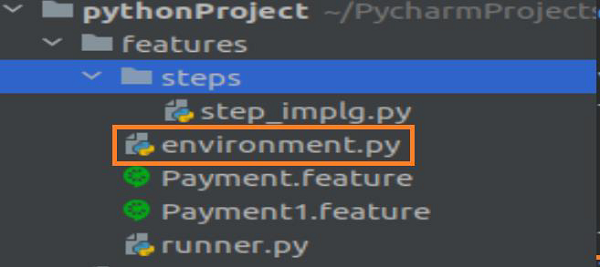
- Behave - Home
- Behave - Introduction
- Behave - Installation
- Behave - Command Line
- Behave - Configuration Files
- Behave - Feature Testing Setup
- Behave - Gherkin Keywords
- Behave - Feature Files
- Behave - Step Implementations
- Behave - First Steps
- Behave - Supported Languages
- Behave - Step Parameters
- Behave - Scenario Outlines
- Behave - Multiline Text
- Behave - Setup Table
- Behave - Steps in a Step
- Behave - Background
- Behave - Data Types
- Behave - Tags
- Behave - Enumeration
- Behave - Step Matchers
- Behave - Regular Expressions
- Behave - Optional Part
- Behave - Multi-Methods
- Behave - Step Functions
- Behave - Step Parameters
- Behave - Runner Script
- Behave - Exclude Tests
- Behave - Retry Mechanism
- Behave - Reports
- Behave - Hooks
- Behave - Debugging
Behave Useful Resources
Behave - Hooks
Behave setup and teardown functions are implemented in a file called the environment.py which is within the features directory that contains the steps folder. The setup functions include browser open, database connection, configurations, and so on.
The teardown functions include browser closure, database connection termination, reversing changes, and so on.
The environment.py file contains the following functions −
before_feature(context, feature) − Executes prior every feature.
before_scenario(context, scenario) − Executes prior every scenario.
before_step(context, step) − Executes prior every step.
before_tag(context, tag) − Executes prior every tag.
before_all(context) − Executes prior everything.
after_feature(context, feature) − Executes post every feature.
after_scenario(context, scenario) − Executes post every scenario.
after_step(context, step) − Executes post every step.
after_tag(context, tag) − Executes post every tag.
after_all(context) − Executes post everything.
The above functions are used as hooks in Behave. Project structure should be as follows −

Feature File with hooks (Payment.feature)
The feature file with hooks for Payment.feature is as follows −
Feature: Payment Process
Scenario: Verify transactions
Given user makes a payment of 100 INR
Feature File with hooks (Payment1.feature)
Given below is the feature file with hooks for Payment1.feature −
Feature: Administration Process
Scenario: Verify admin transactions
Given user is on admin screen
Corresponding step Implementation File, stepImpPayments.py
The step implementation file is as follows −
from behave import *
from parse_type import TypeBuilder
parse_amt = TypeBuilder.make_choice(["100", "10"])
register_type(Amt=parse_amt)
parse_curr = TypeBuilder.make_choice(["INR", "Dollar"])
register_type(Curn=parse_curr)
@given("user makes a payment of {n:Amt} {t:Curn}")
def step_payment(context, n, t):
pass
@given('user is on admin screen')
def step_admin(context):
pass
Hooks in environment.py file
The hooks in environment.py file are as follows:
# before all
def before_all(context):
print('Before all executed')
# before every scenario
def before_scenario(scenario, context):
print('Before scenario executed')
# after every feature
def after_feature(scenario, context):
print('After feature executed')
# after all
def after_all(context):
print('After all executed')
Output
The output obtained after running the feature files is as follows −
(myenv) D:\behave\myenv\pythonProject>behave --no-capture -f plain
USING RUNNER: behave.runner:Runner
Before all executed
Feature: Payment Process
Scenario: Verify transactions
Before scenario executed
Given user makes a payment of 100 INR ... passed in 0.000s
After feature executed
Feature: Administration Process
Scenario: Verify admin transactions
Before scenario executed
Given user is on admin screen ... passed in 0.000s
After feature executed
After all executed
2 features passed, 0 failed, 0 skipped
2 scenarios passed, 0 failed, 0 skipped
2 steps passed, 0 failed, 0 skipped
Took 0min 0.000s